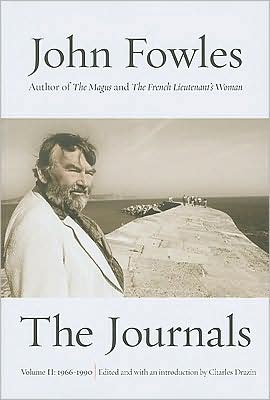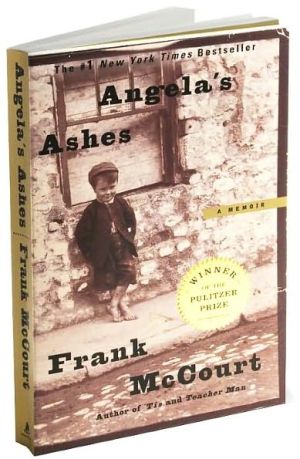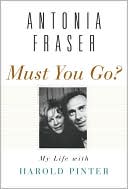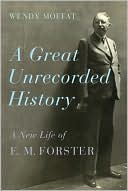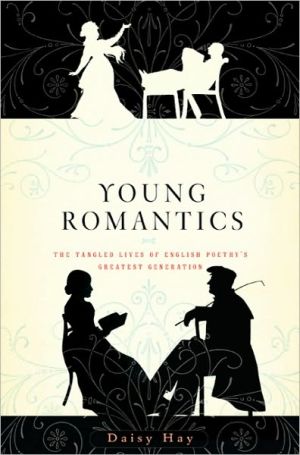The Journals: Volume 2: 1966-1990
John Fowles gained international recognition in 1963 with his first published novel, The Collector, but his labor on what may be his greatest literary undertaking, his journals, commenced over a decade earlier. Fowles, whose works include The Maggot, The French Lieutenant's Woman, and The Ebony Tower, is among the most inventive and influential English novelists of the twentieth century.\ \ The first volume begins in 1949 with Fowles' final year at Oxford. It reveals his intellectual...
Search in google:
The second and concluding volume of John Fowles’s eloquent, revelatory journals, the first of which was widely greeted as a literary landmark (“The book is gripping, and one can’t help feeling that Fowles was writing—with a dogged passion, and almost inadvertently—what may come to be seen as one of the very best of his works” —Literary Review). Commencing in 1966, after the author had already achieved international renown with the publications of The Collector and The Magus, these journals chart the rewards and struggles of Fowles’s continuing career and the inner life of the often-reluctant celebrity.Bravely forthright and honest, Fowles writes in his journals about the attention and wealth that accrued to him with each new book—among them The French Lieutenant’s Woman in 1969 (a film version of which was released to international acclaim in 1981), The Ebony Tower in 1974, Daniel Martin in 1977, A Maggot in 1985—and about his deep ambivalence toward his growing fame. He chronicles his move from London to a remote house on England’s Dorset coast near the town of Lyme Regis, the increasingly isolated life he cultivated there, his disenchantment with what he saw as an unrelenting materialism at the center of contemporary society, and his unwillingness to adopt a public persona for his readers and fans. He describes the strains that grew between him and his wife, Elizabeth, and tells about the challenges—illness, depression, loss—of the passing years. But he describes, as well, the pleasure he found in his ten-year post as curator of the small Lyme Regis historical museum, and the great solace he took in gardening, in books, and in his impassioned study of the flora, fauna, and fossils of the countryside around his home. Fiercely candid, and as ardent, gripping, and beautifully written as his novels, Fowles’s journals illuminate the complex life and mind of one of the most important writers of our time. The New York Times - James Campbell The deepest impression left by The Journals is of how enervating it must have been to be John Fowles. In the stable in his garden, he has a sensation of being haunted by his own ghost: Being dead while I am still alive. Admirers who write letters are like leeches. Society is suffering from a sickness, of which the popularity of Harold Robbins ( a reptile ) is a symptom. When Fowles and his wife, Elizabeth, fly to New York in November 1969 for the publication of The French Lieutenant s Woman, at the peak of his success, they sit around in the hotel for hours, unable to face going out. To face New York. It s partly the wretched central heating, the abominable lassitude it induces. Only Fowles could number central heating among the perils of fame and fortune.
Part One Oxford\ 63 Fillebrook Avenue, Leigh-on-Sea, 11 September 1949\ This so dull life, mingled with hate and annoyance and pity. No attempt here at method or speed. The housework drags on all day - cleaning, hoovering, dusting, making beds, sewing, washing-up and so on. No one ever sits down before suppertime. It is wrong, but the smallness of the rooms and the house is so noticeable now. The nursery stuffed full of things, always untidy; the dining-room dark and gloomy - only the lounge is tolerable, and one never lives there. The cloistered life with no one to talk to, no one to laugh with - here I am like a hermit, and quite unnatural. An absolute craving for new faces, new meetings, new places. I would tell them so much, but a curious obstinacy prevents this. Always an air of mulish hostility.\ 24 September\ Two beautiful things. A big, spacious sunset sky - elegant and not ostentatious, but curiously in the east, to the west nothing but a bank of low, dark clouds. The end of a Spergularia in the microscope - like a minute green saturn.1 A tiny shining ball with a ring of gauzy skin around it. Also the sails of some Thames barges half-hidden by mist. A curious thing. About to throw a piece of screwed-up paper into the yellow jug which serves as waste-paper basket, I said to myself, 'As much chance as you have of being genius.' It fell into the jug without a murmur, a 20 to 1 chance, at the least.\ Another day of silence, listening to other people's trivialities - a dreadful hour at night when all the completely banal information gained from a visit of relatives is repeated and reviewed. Two mathematical impossibilities I should like to see. One, a graph of the words spoken by me each day over a year - the rise and fall would be eye-opening. Near zero here, and normal everywhere else. Two, a count of words spoken by my mother and myself - David and Goliatha!\ The visit by unknown relations is frightening, slightly, to the ego, and being. I feel awkward, not because I feel superior, but because I feel that they feel I am. Probably oversensitivity. But they are definitely not at home with me.\ Trying to get at oneself is a continual unwrapping - each new skin decreases steadily in beauty and value after it is exposed. Always the seed of truth, the maximum fulfilment of self, appears to be just beneath the next layer. Plainly there is no end to this unwrapping, but the sensation is damping.\ Being a poet, divining beauty, is like divining nature - a gift. It does not matter if one does not create. It is enough to have the poetic vision. To see the beauty hidden. As I did tonight, hearing someone whistle in the distance as I stood by an open window. I felt all kinds of moods of streets at night, of walking with loved women, of the dark blue and whiteness, and the strange, magical desertion of streets at night. I felt it all exactly in a moment, such a rush of impressions that they can hardly be seized. Algernon Blackwood: 'To feel like a poet is not to be a poet.'1 True, yet, poetry making is not necessarily the printing of words. It is a philosophical outlook, an epicureanism, a hedonism.\ 25 September\ 3 a.m. Beautifully played New Orleans jazz, with clarinet in low register, and very jazzy tuba and cornet. Bessie Smith singing. This sort of stuff has in it the germ of music that will last.\ Op. 55. Splendidly vigorous, with some of the secret lyricality of the last quartets.2\ Writing fever. Can't get any university work done. Full of ideas for 'Cognac' and full of frustration at not having the time to do them. 'Cognac' must aim at being popular, with art overboard. The idea came all in two hours last night and this morning.\ 30 September\ Another appalling half-hour of talk. When screaming was close. Talk of the utmost banality, on prices of mattresses, on Mrs Ramsey's daughter who married a doctor in Montreal. A few comments are made on poetry. So hopeless to try and explain. They would never understand. No mention of art can ever be developed in case we are 'highbrow' - God, how I hate that word! No philosophy is mentioned, without Thomas Hardy and Darwin getting dragged in. It is la mere. Her attitude to conversation is one of complete alertness. I must break in, and I must say something - and in she breaks and says something, whether she has any knowledge, real opinion or not. It is with great difficulty that I can keep my oyster silence. But I must not hurt. With le pere, it is partly a defence; modernity is ignored, age is suspicious of invention.\ I feel violent with 'hate' against this bloody town. Least violent, now, against the geographical situation (once I longed for Devon), most against the way of life, and then the people who allow it to sap all the beauty of life out of them. All my sympathy goes out to the boy who ran away to be a bullfighter. I'm sure he must have 'felt' the complete horror of this place. This town can have as much horror mentally for a sensitive person as a blitzed city may have, physically, for a turnip. It is the unsociability, the not-knowing-anyone, the having-no-colour, that kills. No interesting people to talk to, no sincere people, no unusual things to do.\ Then there is 'niceness' as a standard of judgement - God, how I hate that word, too! - 'a nice girl', 'a nice road'. Nice = colourless, efficient, with nose glued to the middle path, with middle interests, dizzy with ordinariness. Ugh!\ Oxford, 6 October\ Reread some early poems. All bad. It is like seeing oneself in a film walk naked through a crowded street.\ But then to feel oneself unfolding, like a flower.\ 7 October\ Lunch with Guy Hardy and Basil Beeston and a serious Pole.1 In the Kemp. I cannot concentrate on those with whom I happen to be. Always there are more interesting people at the next table. Beautiful women to be watched. G and BB seem so set up in the world - they sit on a terrace by the sea and I drift past, watching them, jealous, unhappy. Yet I have the jewel. I may drift to even-more-to-be-coveted terraces, and land.\ *\ Immortality is a convention, a white elephant. A futility. There is no logic in planning for it. No enjoyment, no beauty can come out of it. All life should be designed to be contained within life. Within the closed circle. Outside the theatre, the bouquets won't be seen. The turnip who gains fame in his life, and lives, has an immense superiority over the poet who becomes famous after his death, and obscurely exists. Immortality is the gravestone of the spirit. What use is the gravestone?\ 5 November\ Guy Fawkes night. A great crowd of people, vaguely contented at shaking off the discipline of the world as it is. The undergraduates form the largest part, for the most part just watching, with a few active spirits shouting, calling, singing, making speeches. A certain air of forcedness about all these crowds. Fireworks shooting up, and people exploding away from them when they land. The police and the proctors standing ineffectively. Buses moving slowly, cars being rocked and thumped. Many climb up the scaffolding around the Martyr's Memorial,1 then a vague move is made to the Taj Mahal restaurant where there is a man climbing up, men shouting, and a solid mass of people. Water out of the windows.\ Basically one cannot help feeling contempt for all this canaille, noisily and offensively drunk yet not doing anything positive. Most of them posturing in a ridiculous manner. A good many girls, who seem the most genuinely excited.\ To a certain extent there is a vast good will that can be sensed; roughly everyone is together and enjoying themselves, with the police and the proctors symbolizing all kinds of emotion and, ultimately, the determinism in life. GH and BB both enjoy themselves, and look for some means to manifest their lawlessness. I have absolutely no desire to do anything else but watch, wanting to be everywhere and see everything, observing people's faces. Roger Hendry2 is like me but not so finely 'set', for he has to pretend to a certain lawlessness which isn't innate in him at all.\ Too many of the faces are vacuous and want filling.\ The sight of the girl in green, about whom I wrote the Hospital story, with a thick well set-up young man, is distressing. Above all the sight of the moon, nearly full, in a clear night sky, not particularly cold, after a dull, rainy day. I wanted very much to see one of the people who climbed the Memorial fall down to his death. The indrawn breath and sudden laugh would have been most effective.\ 12 November\ A self-searching night at the Podges1, with Faith.\ Faith, a curious kind of extrovert, conversation-dominating, with the same strident rise in pitch (when she wishes to break in on top of anyone else) as M. Confidential, bold, tomboyish - revealing about her monastic father, whom she says worries her greatly at times.\ Podge and Eileen are a perfect duo; in harmony or perfect discord.\ During this evening (having felt ill all day, with a certain amount of pain) I keep very quiet and feel unable to assert myself in any way. Not particularly self-conscious and oversensitive but lacking more than lost colour. Two mes: ego, thinking with and at tangents from the others, full of the right words, curious ideas and so on; and the alter ego, not being able to break into the discussions.\ An empty walk home with Faith, yawning myself and she whistling and singing.3 I feel a vague need to explain myself, and also to know what she is thinking. A wet, warm, windy night.\ I can feel more concretely a philosophy of life on occasions like these. To be persuasive, to watch and analyse, externally; internally, to record and create. It is absolutely necessary to remain balanced; that is, never to become submerged completely - always to have the intention of creating beauty for others, however reduced this infusion into action and society becomes. Theoretically I want to become a core receiving prehensions, being moulded by them, yet remaining pointed in the one direction, towards creation of beauty. I can't pretend that this is a natural attitude; it leads to compression of feeling, to a dangerous bottling of the need to express, an overtense introversion. The advantages are 1. the forming-house for creation (although some kind of objectivity and self-criticism must be obtained), 2. that the final axion is one of external expression in fame through beauty created. It is creation which acts as a safety-valve, as well as being the ultimate purpose. The essentials are constant attention to practice of the means and a self-confident devotion to the end.\ I think that this is the nearest I can get to self-fulfilment, considering, as I do now, that everything is purely relative, and that no beauty is immortal. I can see little point in immortal fame; yet can believe in the human illogic of doing good by the creation of beauty, even though it will only be temporarily existent. (Not forgetting the time-space question, when nothing that has existed can disappear.) Must strive after living glory; it is unnatural to push, but it is necessary.\ We also talked of the parent-child relationship.\ The crux is when the bridge of realization is reached. The otherness of parents, their separate personality, their defaults and often their inferiority. A solid link of respect should be maintained (E)1 - but respect can't come when the 'truth' (however false) seems to be clear. One's parents seem inferior 'x' and nothing can make them respected 'y'. Only hypocrisy and convention. It's like being C of E when there is no faith. Eileen's interesting theory that this break is good for creating individuals; that happy families are those when the children have failed to 'personalize' or 'separate' their parents and so become submerged within the family 'soul' with unrealized individuality.\ Going through a long period of self-discontent; no faith. Fair certainty that several of the projects, especially the plays, are good, but impossibility of long concentration and doubt about powers of technique and realization. Moreover, the consciousness that nothing will be done for at least a year. And at times the deliberate withdrawal from the world becomes too much of an effort to permit any surety.\ 21 November\ The constant quantum of self-estimation and the temporary urges to write which must die away because there is no time to canalize the inspiration. Sense of waste.\ JW.2 Dapper, impeccable, and fairly well off. Conventional and sociable, but without great originality except for a certain facility of wit. Easy to get on with. Not strikingly dressed. Slightly French in manner, not thoroughly English (brought up for some years in France).\ GH. Ex-RAF - still a flyer in the OR.1 Self-possessed, insensitive, often unintentionally rude because of his certainty in self. Intelligent, but apparently not imaginative. His egoism is annoying, partly because it is not fully conscious on his part; it is not deeply objectionable, but annoying. A question of limited assurance, but still assurance. No one sensitive is ever assured. Well-liked by others.\ RF. Religious, obtuse, wet. Wishes to be a schoolmaster. Earnest worker, never relaxing. Constantly a Boy Scout badge in his lapel. Bad French accent, with many stupid remarks. Naive to an infuriating degree. Reliable, always willing to help. Keen on amateur photography; no sense of art, of beauty. Insensitive.\ PW. The most interesting character. An ex-POW, with a brilliant Oxford career. President of French class and OUDS, editor of Isis. A very quiet and silent little person, chubby-faced, with dark glasses always. A problem because his past and his present silence seem to suggest hidden depths, which may or may not exist in truth. By no means infallible or intolerant - an excess of diplomacy, never impolite, brusque or outspoken. Sense of humour; well-chosen opinions and remarks. Listened to deferentially. Today, revealed a little about himself to me for the first time since I met him, i.e. his shyness in discussion, which he confessed.\ MLG. An easy character. Provincial Provencial, but with no great meridional traits, except a certain quickness of temperament. Great sense of humour; polite and very conventional. Not basically a prude, yet unapproachable externally. No warmth of relationship, such as one might find in an English girl (without any implication of love).\ HF (Henri Fluchere).2 Small, temperamental, Provencial. Sense of humour, excellent conversationalist, with sophist and sophisticated dissertations on literature. Unprepossessing appearance - a certain foxiness, slyness, which is misleading. Excellent but badly pronounced English.
\ James CampbellThe deepest impression left by The Journals is of how enervating it must have been to be John Fowles. In the stable in his garden, he has a sensation of being haunted by his own ghost: “Being dead while I am still alive.” Admirers who write letters are “like leeches.” Society is suffering from a “sickness,” of which the popularity of Harold Robbins (“a reptile”) is a symptom. When Fowles and his wife, Elizabeth, fly to New York in November 1969 for the publication of The French Lieutenant’s Woman, at the peak of his success, they sit around “in the hotel for hours, unable to face going out. To face New York. It’s partly the wretched central heating, the abominable lassitude it induces.” Only Fowles could number central heating among the perils of fame and fortune.\ — The New York Times\ \
